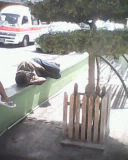Can anyone guess what this guy is doing? Yes, he is dancing, but you want to know something more? This guy is homeless. He was dancing to Frank Sinatra, clumsily coordinated I might add! Can you imagine that? Why did I choose to include this in my blog?
We usually walk or drive past the street dwellers, sometimes trying to avoid them, without even giving a second thought about who they are or what they have done. Admittedly I have fallen into this category as well. But this blog has really given me the opportunity to pay them attention, and stop on the pavement and wonder a little about their life. Like this guy!
Fortunately some places have given street dwellers consideration. For example the Wake Forest University in North Carolina have an annual dance competition to support the homeless. Their members of staff, professors and students put on their dancing shoes in an effort to raise money for the homeless of Bethesda.
But what about the homeless showcasing their own talent. "What talent?" you might ask. But look at the following video and then tell me if you got an answer to your own question.....



